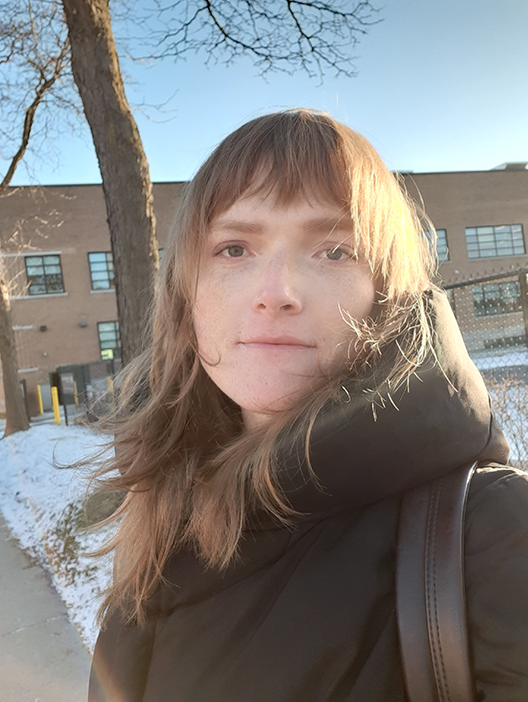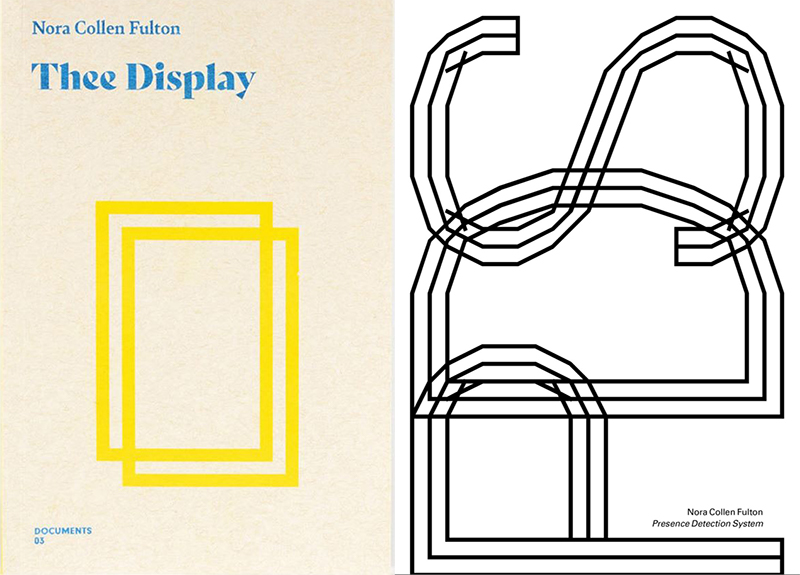We’re thrilled to present an interview with the always-brilliant poet and researcher Nora Fulton. I interviewed Nora by email over the course the dark Covid winter months. Nora discusses her new books of poetry, the effect of the pandemic on her writing, teaching, the philosophy of Alain Badiou, and much, much more.
–Aaron Winslow, Managing Editor

Aaron Winslow: You have two recent books out: Presence Detection System (Hiding Press) and Thee Display (Anteism). They’re both beautiful, rich, and complex books. I want to get into more specifics about them, but I’ll start off much more generally and colloquially: how have you been lately? How has Covid been for you and, in particular, for your writing? Has it changed your writing at all?
Nora Fulton: The release of Presence Detection System still feels quite recent to me, and the release of Thee Display took place during the pandemic, and still feels suspended in amber for that reason. How has Covid been for me? I live in Montreal, Quebec, the province which has been the epicenter of the pandemic in Canada pretty much since the beginning, and we’re now going into lockdown for the third time or so. No rent freezes, just curfews, encouragements to keep shopping and working, while the people who can afford it jet away on trips to the Caribbean. Just your usual mixture of arrogance and foolishness and capitalist violence, dressed up in Quebecois paternalism.
Speaking of writing, though, one of the only unreservedly good things that happened during this span was that I was invited to write an essay for a new album by the cellist Judith Hamann, for Blank Forms, an incredibly inventive record label I admire a lot. It was included as the liner notes, and it speaks a bit to the question above, as well. I highly recommend Hamann’s work, here and elsewhere.
AW: I want to get you to dive into Thee Display. The book constellates the Classical Greek text The Aratea and its translations/mediations/mutations via OCR scanning technology, Badiou’s Logic of Worlds, transitioning, and the loss of your dog (many, many condolences on that). How do you bring all of these discrete parts together?
NF: To summarize what’s going on in Thee Display: essentially, I took a sloppily digitized text–a translation of and monograph on The Aratea, a didactic poem about the constellations–and began looking into the sediment of its passage, as a text, as texts, through history, and the different uses to which it has been put.
I was interested in the language produced when this mode of scanning made mistakes: it mistook grime on the page of the manuscript for asterisks, had no ability at all to render Latin, and so on. I inserted my own writing into these textual ruptures, extended text fragments, or created new ones.
On the one hand this has always been the way I write; many of my books in some way treat texts as sculptural matter one can work with: as found works, as works to cut up, as works one can rewrite and write upon palimpsestically, as works to abstract a drained form from, etc. (I’ve talked elsewhere about why people sometimes associate my poetry with a post-conceptual mood because of these techniques, and my problem with that kind of characterization).
At the same time, I started this project when my dog died. I started it as I began transitioning (unlike my previous book, Presence Detection System, which was rewritten afterwards). I of course started thinking about the relationship between these two things, in light of this text that is about the form of the constellation: a form that is both resistant to change, that one decides upon, sees in the night sky and can teach others to see, and a form that must change, and whose changes run counter to the frankly reactionary mood of so much of the contemporary obsession with astrology (from Adorno on to us I suppose). The truth is, these are all just components of what was going on when I was writing the book. Just like anyone who reads the book, I look at these elements and am tempted to connect them, to find some kind of appearance I can hold on to.
I worry sometimes that I can never bring myself to finish thinking about any of these “discrete parts,” either because of a lack of courage/ability on my part, or a fear that they wouldn’t mean anything anymore if I did. But I also don’t want to be able to say “here is the source of all this in me; here is the shape they make.” Thank fuck I’m not able to do that. Thank fuck we can’t do that with anything, lest we start praising the purity of the Ancient Greeks…
This is what I draw from Alain Badiou’s thoughts on relationality and appearance. To recognize the radical nonrelation between the phenomenal from the ontological is not to wave away or aver to the reality of the former, but to recognize that their nonrelation is itself capable of movement, is capable of “being moving.” What should we see when we look at the sky and see forms? What do we see?

AW: You’re a PhD researcher and also a teacher. How do these other roles/activities influence your poetry and poetics?
NF: I think that my poetry often ends up being the place where the kind of thinking that I do when I engage with theory and philosophy – during my studies right now, but even before that – empties itself out, yields itself up for mockery, or puts speculative and abstract thought to work in an applied way that one can’t predict or intend.
As for teaching, it influences my writing to the same degree as any labour I’ve depended on for subsistence. I’ve been teaching a class on short fiction with a component that concerns the novella, and I’ve gotten interested in people like Boccaccio and Ludwig Tieck, and this renaissance conception of the novella as an encyclopedic form. Being able to explore these things for myself while also introducing them to students has been very productive for me in terms of finding out where to go next with my writing.
But it’s also inextricable from the exploitative economic structures of the university, especially during the pandemic, that it’s hard to say if there has been an aesthetic influence, so much as an aesthetic survival strategy. I would rather my writing influence my teaching.
AW: What’s next for you? Do you have a project in the works?
NF: I have an ongoing repository of poems that might become a manuscript someday, currently called Five Hells, which are all occasional works in a much different mode than anything I’ve written before. I’ve published some pieces in various places online over the last few years–Social Text, Tiny Magazine, Homintern, Some Magazine–but they are more just pieces I have been writing for myself. Poems for friends, poems for moments, which I had never done before, though they probably don’t appear to be that way at all. Maybe I’ll try and do something with them as a whole in a decade or so. I’ve had two books that I’m very proud of come out in the last two years, so I don’t feel particularly rushed right now.
AW: What are you reading, listening, watching, playing, or otherwise engaging with these days that you’re really into?
NF: I recently finished reading Jackie Ess’ soon-to-be-released novel Darryl, from Clash Books, which is very, very good. It’s the kind of work that makes you want to make something like it – very layered, manipulative of the reader, but compassionate, difficult, hilarious. I’ve been systematically watching every film by Keisuke Kinoshita I can find. My favourites so far have been Farewell to Spring and The Ballad of Narayama; I just watched The Young Rebels and Morning for the Osone Family, which were really great as well. Every single film of his is different. He totally reinvents himself for each one. I love the melodrama and visual theatricality of them.
With the writing of my dissertation project building up I’ve been reading a lot around Hegel and Heidegger and others who I need to know more about. In that corner I’d say Pierre Macherey has been someone I’ve been finding very productive lately, as a brilliant commentator on Hegel and Atlhusser and others.

